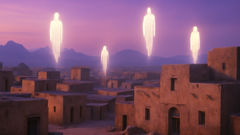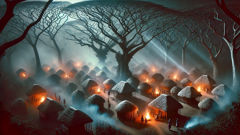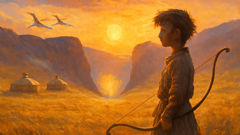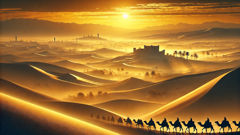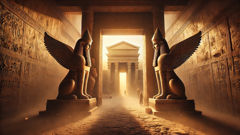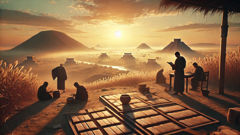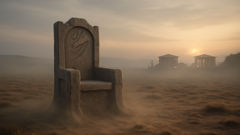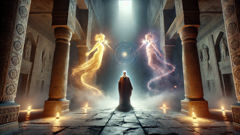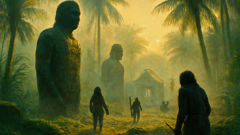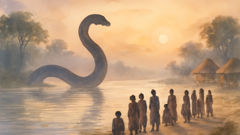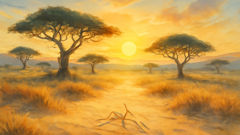Introduction
Under a desert sky that has learned patience, where caravans once traced routes by stars and the river kept its old promises to the stones, the Yazatas moved like a chorus of clear bells. They are not gods of thunder or storm, but hosts of good beings who attend Ahura Mazda in the quiet, stubborn war against shadow. This tale begins with a whisper rather than a trumpet: the soft oath etched into a grandmother’s shawl, the memory of a ritual shared at a village hearth, and the pulse of the earth that never forgets how to dream. In the earliest days, when the world was young and the stars wore patient expressions, Ahura Mazda sent forth the Yazatas to keep the balance between light and dark. They are not solitary heroes; they gather like shepherds guiding a flock, repairing paths that fear has erased, lifting the fallen, and offering courage to those who feel the night closing in like a blanket. The caravan routes that wind through these lands still echo with their stories, and in every village square you might hear a child recall a shimmer of their wings or a voice that promises dawn’s return. The Yazatas are woven into daily life: a blacksmith’s hammer beating in rhythm with a prayer, a farmer praying for rain that seems almost blessed, a mother teaching her son the old song of gratitude. They are patient, tireless, and particular about virtue, noticing not only grand gestures but the quiet, stubborn acts that brighten a world heavy with sorrow. In this legend, the world is not split into saints and sinners but into choices. The Yazatas stand as witnesses to kindness—nudging hearts toward mercy without condemnation. When a village elder speaks of the old fire in the hearth, the Yazatas listen, and the flames answer with a glow that feels almost like a language. They arrive not with horns of alarm but with the fragrance of saffron and rain-washed stones, patient as a bowstring drawn and ready. The purpose of their presence is to remind humanity that courage is a practice, not possession; that wisdom grows from listening as much as from speaking; that darkness is not vanquished by force alone, but by the stubborn light that lives in a neighbor’s hand, a child’s laughter, a storyteller’s careful memory.
Section I: The Assembly of Light
The hills above the cedar groves held many secrets, and in the evening they whispered back to the storyteller who walked their trails with a patient pace. He spoke of the Yazatas as if they were neighbors, present in the quiet of a well-ticked clock and in the sudden, blue arc of a jay’s wing across an already pale sky. They appeared not as distant marble statues but as living presences: a form of light that never exhausted the air, a chorus of voices that did not shout but offered a steady, honest counsel. Each Yazata bore a particular task, a name tied to one virtue, a memory tied to a cosmology that explained why the world holds together when fear tries to loosen its threads. Vohu Manah, the Good Mind, moved like a pale deer through the reeds of a winter river, nudging a boy toward choosing kindness over bravado. Asha Vahishta, the Truth of truth, stood behind a mother as she spoke to her child about honesty, his eyes wide with the gravity of listening. In the markets and the fields, Anahita the Water-bearer walked with a cool, clean rain around the ankles of the thirsty, whispering of bowls that fill not by force but by trust. The Yazatas did not seek trophies; they sought the soft alignment of intentions: a farmer who shares his soil with a neighbor, a widow who teaches a child to measure courage in quiet.
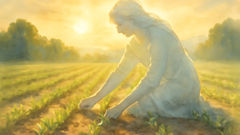
From a high shelf in a ruined temple, the old storyteller pulled from his cloak a small tablet, the surface worn by years of touching, rubbing, and careful reading. He showed it to those who gathered in the village square when the call to listen rose like incense. The tablet held a map of the unseen: a grid where prayers traveled on light as surely as birds ride the wind. The Yazatas guarded those paths, stepping from one letter of a prayer to the next, guiding feet that wandered into danger back onto safe ground. They did not ignore darkness but learned to walk beside it, turning fear into a kind of fuel that would light the way for others. In these moments, the villagers learned to listen for the small sounds that announced the coming of dawn: the tune of a flute carried on a breeze, the slight tremor of a falcon’s wing, the scent of rain on sun-warmed earth. The Yazatas—names whispered into the night—remained a presence that did not demand worship but offered companionship, a steady pairing of action and intention that kept small lamps burning when the wind pressed hard.
It was in this same twilight that the storyteller found his own purpose tested. A drought crept across the land, thinning the rivers until they looked like threads between two dry stones. The village grew pale, the children’s laughter quieted into careful whispers, and the elders sat with their hands folded, listening not for thunder but for a change in the air. The Yazatas did not flood the fields with magic; they offered a plan formed from the wisdom of countless mornings where people chose to do good together—sharing seeds, repairing broken walls, singing the old prayers with the cadence of a well-made clock. The storm they taught was not a single moment of rain but a discipline: to work with the land, to speak kindly to the soil, to give shelter to a traveler at night, to keep faith alive even when the sky looked most accusing. In the assembly of light, the Yazatas taught restraint: let the rain come when the earth has learned what it must learn and the people have learned what they can give to one another. The story held a warning and a promise: darkness returns when hearts forget to listen, but light comes back when neighbors extend hands across the borders of fear and trust.
Section II: The Rainmaker and the Dark
The drought stretched its long fingers toward the village, crossing fields as if tracing the edges of a map that refused to reveal its final destination. The storyteller followed a path that curved through gardens and alleys where old stories lived in the cracks of clay jars and the grain sacks stacked like small forts. In the growth of heat, the Yazatas reappeared, not as distant gods but as travelers who knew every road from the hills to the river’s mouth. They gathered once more, this time in a circle that glowed faintly with the blue-green fire of a remembered ritual. The leader of the host, Mithra’s keeper of covenants, stepped forward in a form that was at once human and more than human, a figure whose eyes held the memory of a thousand dawns. He spoke of promises kept between friends and strangers, of rain that comes not by force but by the patience of a people who refused to surrender their faith to fear. The villagers listened in rapt attention as he taught them a ritual of wind and water, a ceremony that bound their actions to the very breath of the land.
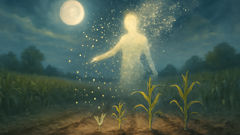
In the moments that followed, a stranger arrived—a traveler from a distant shore who carried a story of his own: a village that learned to share even when the drought pressed hardest, a family that fed a guest before feeding themselves, a child who kept a lamp lit in the night when her village forgot how to dream. The Yazatas did not simply grant this traveler mercy; they invited him to become part of the village memory, a thread in the fabric of the land’s continuity. The traveler spoke of a vow he carried, a vow that every generation must repeat: to act as a guardian of truth, to shelter the weak, to remind others that courage is not the absence of fear but the choice to act in spite of it. The ritual began with songs that rose like smoke above a wick, then settled into the rhythm of rain that did not storm the fields but coaxed them toward growth. The rain arrived not as a deluge but as a evening conversation between soil and seed, a dialogue that promised renewal to those who listened and labored with their hands.
But darkness does not yield easily. Angra Mainyu, the shadow that tests every heart, whispered through the cracks in walls and the hollows of wells. He did not appear in a single form but as a thousand small doubts: the nagging fear that the well will run dry, the whisper that the old gods have forgotten the people who once sang under the moon. The Yazatas met this threat not with fury but with discipline. They taught the villagers to read signs in birds’ flights, in the way rainclouds gather and disperse, in the way a child’s game of marbles returns the laughter to the square. When the storm finally broke, not only did the earth drink its fill, but the people learned something essential: that light grows when a community refuses to abandon one another. The storm’s rain was generous, yet the true harvest lay in the reshaped hearts—neighbors who shared, elders who forgave, and a storyteller who finally understood that his voice, like the rain, could be a conduit for mercy if used with care. The Yazatas retreated, leaving behind a landscape made newly reflective, a village that kept a portion of the night for stillness and another for song, knowing that both can keep a people whole when the nights grow long and cold.
Conclusion
The legend closes not with a triumph of conquest but with an invitation. The Yazatas endure wherever a human heart makes a steady choice toward compassion, justice, and wisdom. They are the patient guardians who walk beside a child who studies the stars, the farmer who shares seed with a stranger, the elder who remembers that truth travels best when spoken with kindness. Darkness is not a final verdict but a test, and tests are meant to be passed not by miracle alone but by the daily acts that knit communities together. As long as people remember to listen—to the soft rain, to a neighbor’s breath, to the old prayers that survive as lullabies for the restless soul—the light will not be extinguished. The host of good beings continues their work in the quiet hours: guiding a hand that steadies a fallen brother, guiding a village toward rain when hope has seemed spent, guiding a father to tell his children that courage is a practice, not a fantasy. So the legend travels onward, carried by storytellers and by the fields and rivers that still remember the names of the Yazatas. And when the night grows deep, and the stars look down with ancient reassurance, the people of the land know that they are not alone. The guardians walk with them, and the dawn they await is already listening, ready to answer with light.

